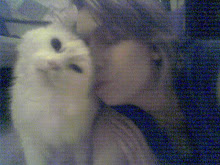Philosophical mumbo jumbo revisited...
Well, in case my previous post about this was confusing (as I imagine my ramblings often are) I decided to take another stab at explaining it. Class was cancelled, so we had one more week to digest the article. I thought I'd read over the article one more time and attempt to explain my frustrations with it more clearly.
Here are two major points I gleaned from the article:
(1) The psychologist often constructs a term to explain a set of behavior. Then it is easy to take the next step of projecting the term on an individual, thereby assuming that the individual is engaged in the behavior indicated by the term. In other words, Bredo states:
"In this form of conceptual confusion, the psychologist believes that the concepts he or she uses to explain the behavior are used by the organism itself" (p. 46).
(2) The second step that is often taken is that the psychologist will assume the term used to describe a behavior is an entity itself and that the entity resides within the individual. For example, intelligence is a term used to describe adaptable behavior and extensive knowledge. However, it is often assumed that intelligence is an ability that an individual possesses to some degree. But, intelligence is a term that describes the behavior. It is not a term that explains the behavior. Suppose we were to ask why a child scored well on an intelligence test and then assume the child did well because she was intelligent. We would be committing a conceptual error according to Bredo (and Gould, among others). This is circular reasoning and also called reification of constructs.
In summary, "one takes a pattern of behavior, gives that pattern a name, takes this named "thing" to be a physical entity or as having some of the properties of a physical entity, and then views the person's behavior as being caused by having this entity inside them....a example would be claiming that a volcano erupts because it has "eruptibility" inside it" (p. 47).
So maybe you can see why I'm a little thrown off. In psychology, you get so used to your particular vernacular that you don't stop to consider that these words have been made up by some psychologist in the past and they have no inherent meaning other than to provide a description. Where do we go from here when almost everything a psychologist talks about is supposedly a reified construct? Beats me...



0 Comments:
Post a Comment
<< Home